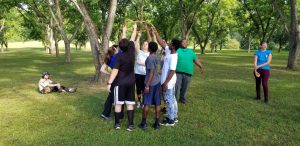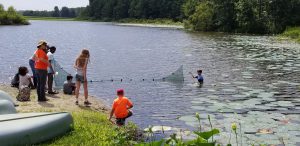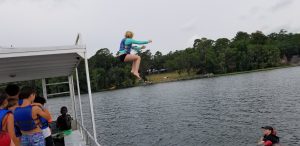Summertime is typically associated with summer vacations, sleeping late, fast foods, rainy days, hot afternoons, and one 4-H camp after the other. Some would argue that summer camps are simply an advanced “day care” program for parents to drop their kids off to “play” so they can be productive at work without worrying about their children. However, research shows that youth who attend camps during the summer come away with so much more than what camping programs are given credit for.
For many youth, traditional summer camp means no homework, no tests, lots of recreation, camp songs, crafts, and lots of swimming. While these are typical camp activities that normally take place during a week of camp, these experiences have a two-fold purpose in that they also serve as a vehicle for significant learning to take place. Many parents are concerned about the amount of knowledge that kids lose during the summer. There has been substantial research that shows students can lose up to 3 months of what has been learned during the school year. By keeping young people’s brains active, acquiring new skills and knowledge, camp offers the chance to decrease the typical summer learning deficit. How is this done??……I’m glad you asked!
4-H is intentional in providing critical components of a successful learning experience as part of all its summer camp curriculum. These Essential Elements are: Belonging, Independence, Mastery, and Generosity. They are designed to meet the developmental needs of youth. Let me give you some examples.
4-H Camp attendees experience a sense of Belonging, the first Essential Element, during cooling off time at 4-H Camp Cherry Lake, while being cared for by camp staff, counselors, and 4-H Youth Development Professionals. Campers enjoy being in a safe place with their peers without a fear of being bullied. 4-H accepts youth where they are and helps them ignite the spark that exist within them, enabling them to reach their potential.
With no parents on the camp grounds telling their children what to do and when to do it, Independence, the second Essential Element, is a key element that a residential or day camp provides for its attendees. Providing the opportunity for youth to be independent thinkers and to better understand themselves develops at camp as youth learn to make decisions based on experiences and knowledge obtained during camp.
In order to develop the self-confidence needed for youth to feel they can be successful, camp provides many opportunities for Mastery, the third Essential Element, to take place. Whether it is passing the swim test, learning a new skill, or leading a game, having that “I can do this” moment for a camper can make a positive impact on a young person’s life.
Lastly, 4-H camps provide opportunities for youth to learn the importance of Generosity, the fourth Essential Element, by learning and working with campers from diverse backgrounds and different socio-economic levels. Camp could very well be the first time they have spent an increased amount of time with people whose background, race or religion is different from their own. Through planned program curriculum consisting of team building and get acquainted activities throughout the week, the campers learn to focus on what they have in common and to value the contributions of others who may not look or act like them.
So being away from home, making new friends, being a part of a team, and trying new things are key building blocks to obtaining a successful experience to meet the developmental needs of youth. 4-H summer camp provides youth the platform to create great memories and lasting relationships that can last a lifetime.
For more information on how your youth can participate in 4-H camps, find your local UF IFAS Extension Office and contact your 4-H Agent to explore what programs are offered in your area.
- Key Elements of a Successful 4-H Camp Counselor Program - March 8, 2024
- Life Skills Aren’t Just Fair…..They Are Sooo Much More! - April 26, 2023
- Priority Life Skills in Florida 4-H - April 13, 2023



